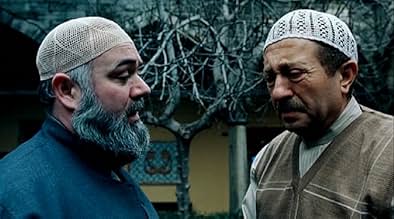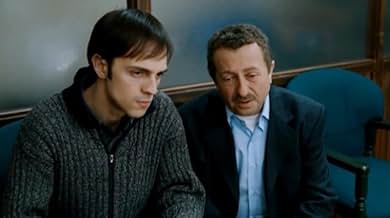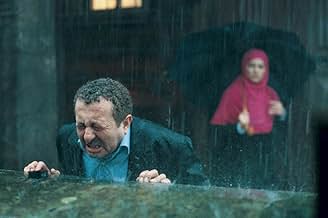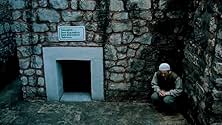Takva
- 2006
- 1 घं 36 मि
IMDb रेटिंग
7.4/10
14 हज़ार
आपकी रेटिंग
अपनी भाषा में प्लॉट जोड़ेंA promotion brings a Muslim's relationship with God into question.A promotion brings a Muslim's relationship with God into question.A promotion brings a Muslim's relationship with God into question.
- पुरस्कार
- 19 जीत और कुल 15 नामांकन
फ़ीचर्ड समीक्षाएं
Takva attempts to achieve two things; It is a philosophical drama, and also a quasi-documentary. Putting the main character in a low-profile religious order, and in a ethical conundrum, the movie makers hit two birds with one reel.
Religious orders and their role in the growing politicization of Islam in Turkey is a sensitive subject. The movie refrains from saying much politically, or the characters do not have lines that can be interpreted in such a manner. However, 'Takva the documentary' speaks volumes.
Takva has good actors such as Erkan Can (the lead), a straightforward but engaging story, and a lot to learn from.
Religious orders and their role in the growing politicization of Islam in Turkey is a sensitive subject. The movie refrains from saying much politically, or the characters do not have lines that can be interpreted in such a manner. However, 'Takva the documentary' speaks volumes.
Takva has good actors such as Erkan Can (the lead), a straightforward but engaging story, and a lot to learn from.
10ogsezer
I would like to mention a different side of the movie that sheds light on Sufi or Mevlevi orders in Turkish and Islamic history.
Why Muharrem is selected for this task to perform financial affairs of the order? The answer is related with the stages of knowledge or purity that one has to qualify to become a "Perfect Human Being" or "insan-i kamil" in Turkish. This concept or ideology is rooted with Islamic tradition. Many Sufi or Mevlevi order has this process for their dervishes which may take a lifetime to achieve this goal or even never be able to reach that level of "perfection".
Different than being nun or monk which requires leaving mainstream society and living in the monastery with prayers, last step of this difficult and lengthy process of purifying one's soul from earthly desires, is to be able to return to the real world after so many years lived in contemplation and yet not being disturbed with its appeal to commit sin. I believe in the last few minutes head of the order explains this a little bit. And apparently Muharrem failed to accomplish last stage before achieving "perfection".
Why Muharrem is selected for this task to perform financial affairs of the order? The answer is related with the stages of knowledge or purity that one has to qualify to become a "Perfect Human Being" or "insan-i kamil" in Turkish. This concept or ideology is rooted with Islamic tradition. Many Sufi or Mevlevi order has this process for their dervishes which may take a lifetime to achieve this goal or even never be able to reach that level of "perfection".
Different than being nun or monk which requires leaving mainstream society and living in the monastery with prayers, last step of this difficult and lengthy process of purifying one's soul from earthly desires, is to be able to return to the real world after so many years lived in contemplation and yet not being disturbed with its appeal to commit sin. I believe in the last few minutes head of the order explains this a little bit. And apparently Muharrem failed to accomplish last stage before achieving "perfection".
Saw Takva last night at The Sydney Film Festival 2007, utterly compelling, driven by Erkan Can's fine performance as Muharrem, a devout Muslim in contemporary Istanbul. Previous posts outline more.
I was fascinated by the way Takva engages with contemporary Turkey, a notionally democratic and secular society since the 1920s. Yes, Muharrem has an existential crisis, also familiar to audiences of Shrek 3 in another way ... dare I mention it, by profane comparison.
I suspect Takva has a satirical streak, once you imagine the dervishs's lodge could be the current government of Turkey.
Am I right? Responses from Turkish members most welcome.
I was fascinated by the way Takva engages with contemporary Turkey, a notionally democratic and secular society since the 1920s. Yes, Muharrem has an existential crisis, also familiar to audiences of Shrek 3 in another way ... dare I mention it, by profane comparison.
I suspect Takva has a satirical streak, once you imagine the dervishs's lodge could be the current government of Turkey.
Am I right? Responses from Turkish members most welcome.
... seems to be the question at the heart of this Turkish film about a simple man living a simple life until his world is turned upside down when he is suddenly exposed to the modern world in the service of his religion. Muharrem is at the center of this character study. He is a very nondescript looking man of about 40 who has been in the service of sack dealer Ali Bey and his family since childhood. He is called an apprentice, but he acts basically as a stock boy and runner of errands. He has been stuck at this point since he was a child with no hope of being more than he is, and he seems fine with that. He lives a simple life in simple quarters and rigidly adheres to his religious sect's rules without question.
What changes everything is when the leader of his religious sect selects Muhareem to be the organizer of finances for the group. With absolutely no training in this area and no prior exposure to the modern world and culture, he is thrust into a position of authority wandering about town collecting the sect's rents. When he is handed a cell phone to call Rauf - his superior and adviser - in case he has questions during his rounds, he looks as though he has been handed a piece of biomedical equipment that he must somehow assemble.
Muhareem finds himself morally challenged and psychologically troubled when he is exposed for the first time to power, money, and sex. The power comes in the form of regard that he's never had before from people who have previously treated him as though he was invisible. His new sexual temptations come in the form of things as simple as having to walk past a long line of female mannequins dressed in lingerie on his way to collect some rent moneys. Muhareem has never seen such sights before, and soon he is having disturbing dreams. Also, he begins to see an equally troubling change in his own personality that seems to be required for him to do his new job correctly, but goes against the grain of all he has ever believed to be righteous.
This film is set in Turkey and the sect in question is the Sufi branch of Islam, but it could easily be set anywhere in the world and involve any religion - the themes are universal. Highly recommended.
What changes everything is when the leader of his religious sect selects Muhareem to be the organizer of finances for the group. With absolutely no training in this area and no prior exposure to the modern world and culture, he is thrust into a position of authority wandering about town collecting the sect's rents. When he is handed a cell phone to call Rauf - his superior and adviser - in case he has questions during his rounds, he looks as though he has been handed a piece of biomedical equipment that he must somehow assemble.
Muhareem finds himself morally challenged and psychologically troubled when he is exposed for the first time to power, money, and sex. The power comes in the form of regard that he's never had before from people who have previously treated him as though he was invisible. His new sexual temptations come in the form of things as simple as having to walk past a long line of female mannequins dressed in lingerie on his way to collect some rent moneys. Muhareem has never seen such sights before, and soon he is having disturbing dreams. Also, he begins to see an equally troubling change in his own personality that seems to be required for him to do his new job correctly, but goes against the grain of all he has ever believed to be righteous.
This film is set in Turkey and the sect in question is the Sufi branch of Islam, but it could easily be set anywhere in the world and involve any religion - the themes are universal. Highly recommended.
It's a good movie to get know a profile of the religious Muslims, to get know "sects" and the amazing, fascinating worship of them. To find answers to the questions like; "how does a sect process and what's happening inside of a sect?". But it doesn't give a political message, a movie that "sit on the fence". But I congratulate the director for at least his bravery to submit these kind of sources and to try to answer some questions or to ask some questions. The main actor Erkan Can has a great performance.
Besides the musics that are made by Replicas, (Gokce Akcelik) are great. Enjoy...
Besides the musics that are made by Replicas, (Gokce Akcelik) are great. Enjoy...
क्या आपको पता है
- ट्रिवियाTurkey's Official Submission to the Best Foreign Language Film Category of the 80th Annual Academy Awards (2008).
टॉप पसंद
रेटिंग देने के लिए साइन-इन करें और वैयक्तिकृत सुझावों के लिए वॉचलिस्ट करें
- How long is Takva: A Man's Fear of God?Alexa द्वारा संचालित
विवरण
- रिलीज़ की तारीख़
- कंट्री ऑफ़ ओरिजिन
- आधिकारिक साइट
- भाषा
- इस रूप में भी जाना जाता है
- Takva: A Man's Fear of God
- फ़िल्माने की जगहें
- उत्पादन कंपनियां
- IMDbPro पर और कंपनी क्रेडिट देखें
बॉक्स ऑफ़िस
- दुनिया भर में सकल
- $20,40,826
- चलने की अवधि1 घंटा 36 मिनट
- रंग
- ध्वनि मिश्रण
- पक्ष अनुपात
- 1.85 : 1
इस पेज में योगदान दें
किसी बदलाव का सुझाव दें या अनुपलब्ध कॉन्टेंट जोड़ें

























